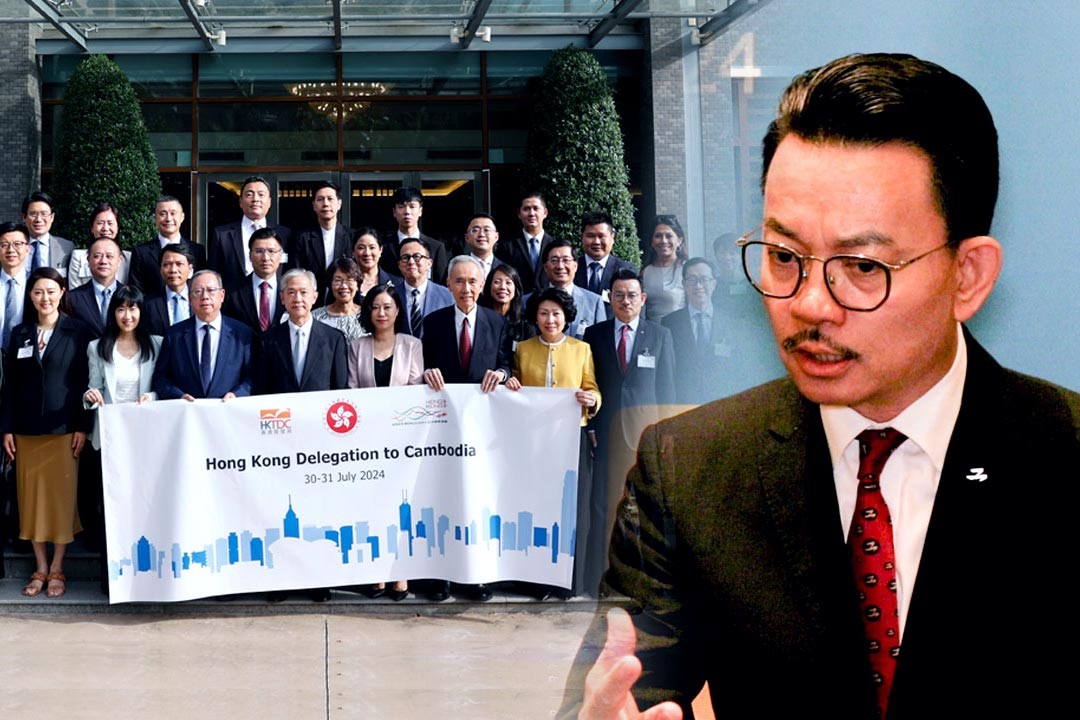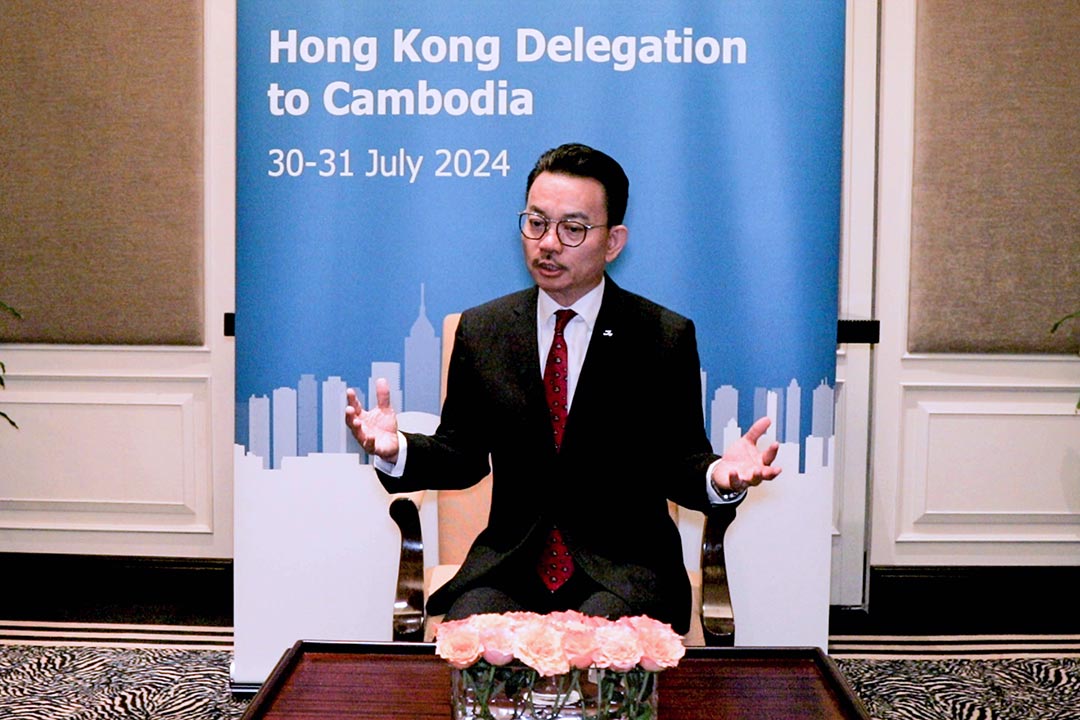
Some 30 leaders of businesses and conglomerates from Hong Kong and mainland China operating in various industries paid a visit to Cambodia from July 30-31, 2024, as part of a delegation organised by the Hong Kong Trade Development Council (HKTDC), and led by John Lee, Chief Executive of the Hong Kong Special Administrative Region (HKSAR).
The Hong Kong delegation's arrival in Cambodia was part of a three-country visit to the ASEAN region, which also marked the first ever visit of a HKSAR Chief Executive to the Kingdom, and saw the signing of 13 Memoranda of Understanding (MOUs) in areas such as trade and investment promotion, innovation and technology, transport, banking, and industrial development.
During a business luncheon organised at the Sofitel Phnom Penh Phokeethra on July 31, B2B Cambodia had a chance to interview one of the visiting delegation members, Steve Chuang, Chairman of the Federation of Hong Kong Industries (FHKI), to get his main thoughts and reflections on the potential for future collaboration and investment between Hong Kong and Cambodia.
The FHKI is the only government formed chamber of commerce and industry in Hong Kong with 4,000 members across the Greater Bay Area (GBA), which includes Hong Kong, Macau and nine cities in Southern China.
High Potential In Manufacturing For Hong Kong Investment In Cambodia
Chuang highlighted manufacturing and production as key areas for greater collaboration between Hong Kong and Cambodia. He pointed to the manufacturing ecosystem in place in GBA, where upstream research and development (R&D) typically takes place in Hong Kong and much of the pilot testing and production in southern China. However, there is an interest in establishing a base in an ASEAN country for the stage of mass production.
“When it comes to mass production, we would like to select an ASEN country like Cambodia,” said Chuang.
We are here because [Cambodia] has people, reasonable cost of land, and a very stable government, so we think here we can mass produce our technology, and we can export to the States, to Europe, to China, etc.
On the other hand, Chuang highlighted Hong Kong's status as an international financial centre, an innovation and technology hub, an expert in professional services and a ‘gateway’ to China, to appeal to Cambodian businesses that are interested in exporting products internationally.
“Hong Kong is part of the GBA… which has a population of 82 million, five times the population of Cambodia… If a Cambodian company would like to export a product to China, think about Hong Kong,” he said. “First come to Hong Kong… we can test and promote the product in Hong Kong and the GBA, and after that, you can extend to the 1.4 billion population of China. So we call Hong Kong a gateway.”
Establishing A Federation Of Hong Kong Industries Chapter In ASEAN And Cambodia
The Hong Kong delegation's visit to Cambodia included an announcement from the Chairman of the HKTDC, Dr Peter K N Lam, that the council would soon be establishing a new consultant office in Phnom Penh, expanding the number of its global offices to over 50.
Chuang further shared that the FHKI has officially kicked off its ASEAN chapter this year, establishing its first office in Vietnam, and is proactively seeking to establish an office in Cambodia soon as well.
“This will act as a connection from Hong Kong to Cambodia to help our members connect business-to-business (B2B), business-to-government (B2G)… When they come to the country and want to hire people, human resources, etc., we can help them," he said.

How Can Hong Kong Contribute To The Development Of Cambodia's Manufacturing Landscape?
Since many Hong Kong companies are engaged in advanced manufacturing practices, Chuang emphasised that such companies establishing offices and factories in Cambodia can help to develop and upgrade the local manufacturing landscape accordingly, aiding in the country's long-term aspiration of becoming a high-income country.
“Our members always have what you would call advanced manufacturing techniques, so when we come here, we are not just looking for cheap labour cost,” he said. “Hong Kong, in the past 10 years, has been promoting innovation technology and so-called new industrialisation… and I think that can also help Cambodia to move up to becoming a high-income country."
Research and development (R&D), advanced manufacturing, and professional services, this is our key ecosystem – R.A.P. I think we are moving all these high value-added industries to Cambodia.
He also suggested that since most Hong Kong companies are exporting products to markets in Europe, the U.S. and China, they have to be strongly compliant with, for example, ESG (environmental social and governance) and Carbon Border Adjustment Mechanism (CBAM) requirements, so Hong Kong factories being established in Cambodia could help to pull up industry-wide sustainability standards.
[Hong Kong companies can act as] an outside force that pushes local Cambodian companies to do better in sustainability and environmental protection.
Challenges Hong Kong Businesses Face In Cambodia
“The biggest challenge for our members in this country is talent, because to move up to the high-end value chain, you need the skillful people,” said Chuang.
He, however, stressed that Hong Kong businesses are ready to take this challenge on and invest in skills development with a focus on the long-term.
We are here to help [workers] in Cambodia, we offer scholarships, we welcome them to Hong Kong to learn, we want to share value, share our technology, and our way of management.
Another difficult aspect Chuang sees for Hong Kong businesses in Cambodia is the current level of transportation and logistics available in the country, which he described as “still not there” yet. However, he said he was heartened to hear Deputy Prime Minister Sun Chanthol, First Vice-Chairman of the Council for the Development of Cambodia (CDC), speak about the projects and plans in place to develop Cambodia's infrastructure, so he expects the situation to be different in the next five years or so.
Message To Cambodian Businesses Considering Collaboration With Hong Kong
The interview concluded with a message Chuang wished to share with Cambodian businesses considering collaboration with Hong Kong.
“We businessmen in Hong Kong, we really like the potential of [Cambodia], and I think [Cambodian businesses] should also fully utilise Hong Kong, because Hong Kong has free-flow of people, free-flow of cash, free-flow of goods, there's no tax at all, so that is a good point as a gateway to the world and as a gateway to China,” he said.
You can see that there is synergy between Hong Kong and Cambodia, and especially… I think it's very important that the country is stable and that the country's relationship with China is so good. That is fundamental, because without a good relationship it's very difficult to do business.